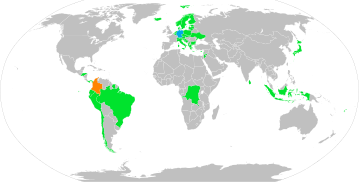การเลือกตั้งระบบสัดส่วนแบบบัญชีรายชื่อเปิด
การเลือกตั้งระบบสัดส่วนแบบบัญชีรายชื่อเปิด (อังกฤษ: open list) หรือ "แบบเปิด" เป็นการเลือกตั้งประเภทหนึ่งของระบบสัดส่วนแบบบัญชีรายชื่อ โดยผู้มีสิทธิเลือกตั้งมีส่วนในการเลือกผู้สมัครที่ชอบจากรายชื่อของพรรคการเมืองในพรรคการเมืองที่ต้องการเลือกได้ โดยระบบที่ตรงข้ามกันเรียกว่า ระบบปิด ซึ่งสมาชิก ผู้บริหาร หรือที่ปรึกษาพรรคการเมืองจะเป็นผู้กำหนดลำดับในบัญชีรายชื่อโดยที่ผู้ใช้สิทธิเลือกตั้งไม่สามารถเลือกบุคคลตามประสงค์ได้นอกเหนือจากลำดับที่จัดไว้แล้ว

นอกจากนี้ ระบบเปิดนี้ยังทำให้ผู้มีสิทธิสามารถเลือกบุคคลได้มากกว่าพรรคการเมือง โดยในแต่ระบบนั้นให้สิทธิของผู้มีสิทธิเลือกตั้งมากน้อยต่างกันในการเลือกผู้แทน โดยตัวเลือกที่ผู้มีสิทธิเลือกนั้นเรียกว่า "ผู้สมัครที่ชอบ" (preference vote) ซึ่งโดยมากการเลือกตั้งลักษณะนี้จะอนุญาตให้ผู้มีสิทธิเลือกผู้สมัครได้มากกว่าหนึ่งคนในระบบเปิด
ประเทศที่ใช้ระบบสัดส่วนแบบบัญชีรายเปิด
แก้แอฟริกา
แก้อเมริกา
แก้เอเชีย-แปซิฟิก
แก้ยุโรป
แก้- แอลเบเนีย[15]
- ออสเตรีย[16]
- เบลเยียม[16]
- บอสเนียและเฮอร์เซโกวีนา[17]
- โครเอเชีย[18]
- ไซปรัส[16]
- เช็กเกีย[CEPPS 4]
- เดนมาร์ก[16]
- เอสโตเนีย[CEPPS 5]
- ฟินแลนด์[16]
- เยอรมนี ในรัฐ
- รัฐไบเอิร์น
- เบรเมิน
- ฮัมบวร์ค
- ใช้ในการเลือกตั้งระดับเทศบาลในหลายรัฐ
- กรีซ[16]
- อิตาลี ใช้สำหรับการเลือกตั้งสภายุโรป, ระดับแคว้น และระดับเทศบาล (ในอดีตใช้สำหรับการเลือกตั้งสมาชิกรัฐสภา)[19]
- ลัตเวีย[CEPPS 6]
- ลีชเทินชไตน์[16]
- ลิทัวเนีย[20]
- ลักเซมเบิร์ก[CEPPS 7]
- เนเธอร์แลนด์[CEPPS 8]
- นอร์เวย์[CEPPS 9]
- โปแลนด์
- ซานมารีโน[16]
- สโลวาเกีย[CEPPS 10]
- สโลวีเนีย[CEPPS 11]
- สวีเดน[CEPPS 12]
- สวิตเซอร์แลนด์[2]
- ยูเครน[21]
รัฐ/ประเทศที่ยังไม่ได้รับการรับรอง
แก้บันทึกเพิ่มเติม
แก้CEPPS
- ↑ "Country Profile: Colombia". 2012-06-19. สืบค้นเมื่อ 07/08/2012.
{{cite web}}: ตรวจสอบค่าวันที่ใน:|access-date=(help) - ↑ "Country Profile: Indonesia". 2010-11-26. สืบค้นเมื่อ June 30, 2012.
- ↑ "Country Profile: Sri Lanka". 2010-02-18. สืบค้นเมื่อ June 30, 2012.
- ↑ "Country Profile: Czech Republic".
- ↑ "Country Profile: Estonia". 2011-04-15. สืบค้นเมื่อ June 30, 2012.
- ↑ "Country Profile: Latvia". 08/05/2011. สืบค้นเมื่อ June 30, 2012.
{{cite web}}: ตรวจสอบค่าวันที่ใน:|date=(help) - ↑ "Country Profile: Luxembourg". 02/04/2010. สืบค้นเมื่อ 07/08/2012.
{{cite web}}: ตรวจสอบค่าวันที่ใน:|access-date=และ|date=(help) - ↑ "Country Profile: Netherlands". 2010-10-14. สืบค้นเมื่อ June 30, 2012.
- ↑ "Country Profile: Norway". 2011-03-18. สืบค้นเมื่อ 07/08/2012.
{{cite web}}: ตรวจสอบค่าวันที่ใน:|access-date=(help) - ↑ "Country Profile: Slovakia". 02/01/2012. สืบค้นเมื่อ June 30, 2012.
{{cite web}}: ตรวจสอบค่าวันที่ใน:|date=(help) - ↑ "Country Profile: Slovenia". 2012-02-28. สืบค้นเมื่อ June 30, 2012.
- ↑ "Country Profile: Sweden". ElectionGuide. Consortium for Elections and Political Process Strengthening. 2010-08-08. สืบค้นเมื่อ 07/08/2012.
{{cite web}}: ตรวจสอบค่าวันที่ใน:|access-date=(help)
อ้างอิง
แก้- ↑ "IPU PARLINE database: DEMOCRATIC REPUBLIC OF THE CONGO (Assemblée nationale), Electoral system".
- ↑ 2.0 2.1 2.2 Mainwaring, Scott (October 1991). "Politicians, Parties, and Electoral Systems: Brazil in Comparative Perspective" (PDF). Comparative Politics. 24 (1): 21–43. doi:10.2307/422200. JSTOR 422200.
- ↑ Craig Arceneaux, Democratic Latin America, Routledge, 2015 ISBN 9781317348825 p.339
- ↑ George Rodriguez, "Voters head to the polls in El Salvador to elect legislators, mayors", Tico Times, 28 February 2015
- ↑ (ในภาษาสเปน) "Papeletas para las elecciones 2015 (reproduction of ballot papers and explanation of the new voting system)", Tribunal Supremo Electoral
- ↑ Matthew S. Shugart, "El Salvador joins the panachage ranks, president’s party holds steady", Fruits and Votes, 8 March 2015
- ↑ "Honduras", Election Passport
- ↑ "IPU PARLINE database: PANAMA (Asamblea Nacional), Electoral system".
- ↑ "IFES Election Guide | Country Profile: Peru".
- ↑ "http://archive.ipu.org/parline-e/reports/2299_B.htm"
- ↑ Fijan elections office. "Electoral decree 2014" (PDF). คลังข้อมูลเก่าเก็บจากแหล่งเดิม (PDF)เมื่อ 14 July 2014. สืบค้นเมื่อ 3 July 2014.
- ↑ ja:非拘束名簿式
- ↑ "IPU PARLINE database: JORDAN (Majlis Al-Nuwaab), Electoral system".
- ↑ "Lebanon to hold parliamentary elections in May 2018". สืบค้นเมื่อ 23 June 2017.
- ↑ Instituti i Studimeve Politike, Albanian Helsinki Committee, Civil Rights Defenders, European Union (2020). "Broshurë Informative mbi proceset zgjedhore Parlamentare dhe Lokale në Shqipëri, mbi partitë politike, legjislacionin, rekomandimet e OSBE/ODIHR (1991-2020)" [Information Booklet on Parliamentary and Local Electoral Processes in Albania, on Political Parties, Legislation, OSCE / ODIHR Recommendations (1991-2020).] (PDF) (ภาษาแอลเบเนีย). Instituti i Studimeve Politike (ISP). เก็บ (PDF)จากแหล่งเดิมเมื่อ 1 February 2021.
{{cite web}}: CS1 maint: uses authors parameter (ลิงก์) - ↑ 16.0 16.1 16.2 16.3 16.4 16.5 16.6 16.7 "Electoral Systems in Europe: An Overview". European Parliament in Brussels: European Centre for Parliamentary Research and Documentation. October 2000. คลังข้อมูลเก่าเก็บจากแหล่งเดิมเมื่อ May 9, 2013. สืบค้นเมื่อ July 6, 2012.
- ↑ "Izborni zakon BiH, članovi 9.5 i 9.8" (PDF). สืบค้นเมื่อ September 2, 2012.
- ↑ "Zakon o izborima zastupnika u Hrvatski sabor (Act on Election of Representatives to the Croatian Parliament)" (ภาษาโครเอเชีย). สืบค้นเมื่อ April 8, 2018.
- ↑ Miriam A. Golden, Lucio Picci (April 2008). "Pork-Barrel Politics in Postwar Italy, 1953-94" (PDF). American Journal of Political Science. 52 (2): 268–289. doi:10.1111/j.1540-5907.2007.00312.x.
{{cite journal}}: CS1 maint: uses authors parameter (ลิงก์) - ↑ "IFES Election Guide | Country Profile: Lithuania".
- ↑ UkrInform: Ukrainian parliament adopts Electoral Code, Kyiv Post